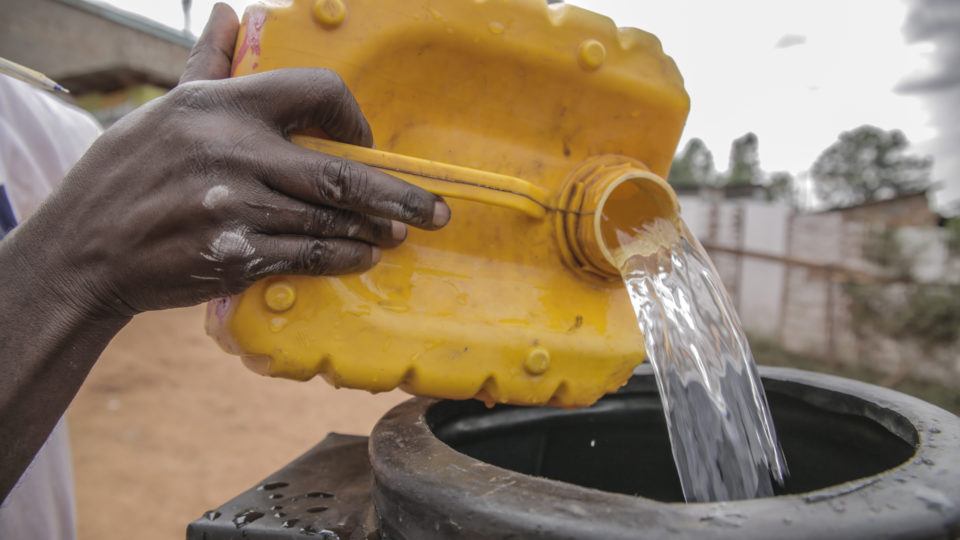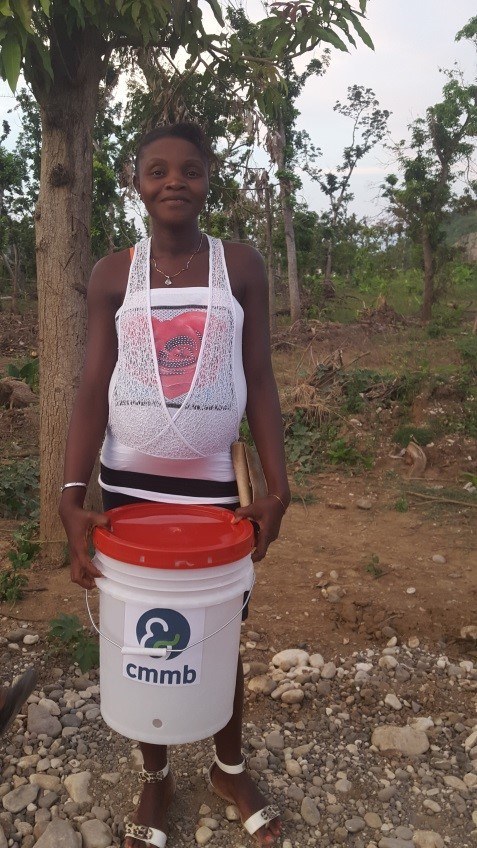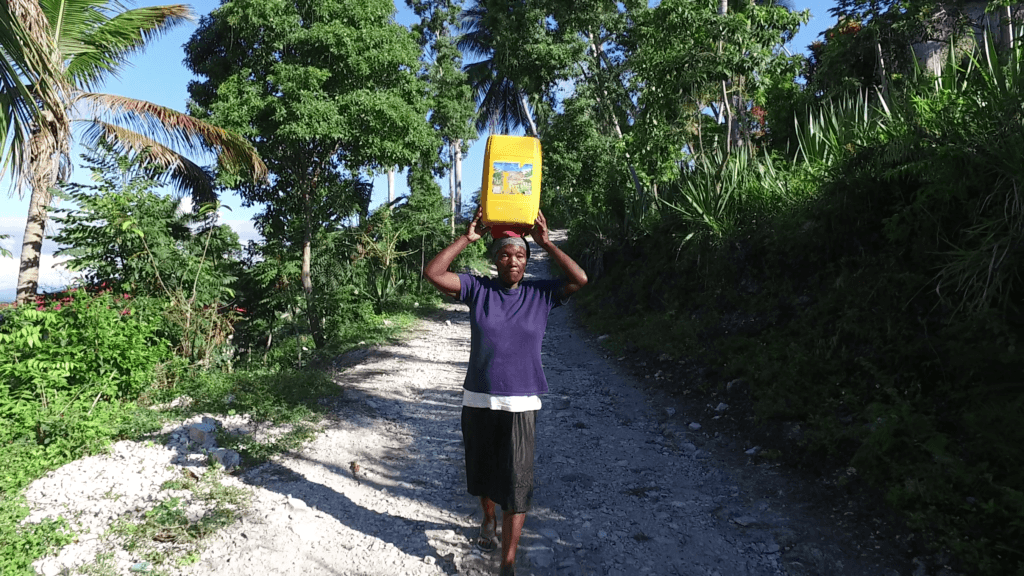Safe Water Projects Mean Healthier Lives in Haiti

Clean water is the foundation of healthier lives. Yet, in many of the communities where CMMB works in Haiti, the majority of households depend on water from potentially contaminated, unprotected, and unsafe sources. This reliance creates dangerous health risks, especially for young children.
Lack of access to safe drinking water and sanitation contribute to the staggering burden of diarrheal diseases worldwide. For the very young, these diseases are debilitating and even life threatening. Safe water and sanitation are key to escaping poverty. Without access to both, good health is impossible.
Diarrhea kills 2,195 children every day—more than AIDS, malaria, and measles combined
In Haiti, CMMB partnered with the Haiti Child Health Project to implement programs to bring safe water and sanitation to the communities who need them most.
Simple, Sustainable Solutions: Water Filters Change Lives
Dr. Dianne Jean-François, CMMB’s Haiti program country director, is continually working to tackle the challenges of safe water and sanitation in marginalized communities. It can be a critical issue in coastal communities, especially in the aftermath of hurricane season each year.
After Hurricane Matthew in 2016, CMMB teams set mechanisms in motion to protect the residents of Côtes-de-Fer, one of the areas where CMMB works as part of its Haiti Child Health Project (HCHP). HCHP is funded by the United Methodist Church General Board of Global Ministries and implemented in collaboration with the Église Méthodiste d’Haïti (the Methodist Church of Haiti), with the support of Haiti’s Ministère de la Santé Publique et de la Population (Ministry of Public Health and Population).
After the storm, CMMB distributed water filters provided by Sawyer International , to make river water and water from other available but contaminated sources potable for families. These activities were part of the water and sanitation component of the HCHP project.
In all, more than 600 water filters were distributed in Gébeau and Gris-Gris. They are life-changing for women who otherwise have no choice but to walk for hours to reach a reliable water source. Patricia Cherry, a mother of four who is expecting her fifth child, was one of the beneficiaries. She lives with her sister, Micheline, in Gébeau.
“Receiving a water filter means so much to me,” said Patricia. “Finding water that is safe for me and my children to drink or to use for cooking is really difficult.”
Before she received the filter, Patricia had to walk an hour to find potable water. The walk home with heavy, full containers takes even longer. This situation is not uncommon among Haitians, because the country does not yet have a reliable system for drinking water management for in provincial towns.
“Now that we have this filter in the house, my sister and I won’t have to walk as much anymore!” exclaimed Patricia, laughing.
This success story reminds us that there are many more women like Patricia who lack clean water, and would benefit from safe water projects like those implemented by HCHP. Akianne, is one of them. A 68-year-old widow, Akianne lives alone in a very remote area of Côtes-de-Fer. She knows more than anyone the importance clean water and sanitation practices. Last year, her community faced a cholera outbreak due to the community-wide practice of open defecation. Akianne does have a latrine, although it is poor condition. Every day, in order to get water, Akianne must walk two hours to reach a community well, however, when she makes the tiring journey home, she does not have the resources to treat to treat water. The HCHP program was implemented so that women like Akianne, at the very least, are able to treat their water.
Additionally, the HCHP program provides services to women that result in safer births, better nutrition, and reduced mortality from childhood illnesses. The program includes development activities that are structured to support health-seeking behaviors among women in communities. These services come together to provide healthier and happier lives for women, children, and communities. After all, we believe that change begins with her.
Encouraging Healthy Habits: If You Build It, They Will Come
As recently as a year ago, a visitor to the remote, rugged hills of Gris-Gris in need of a toilet was told there wasn’t one. Most families in this community live without electricity and running water, and very few even have a simple latrine. Villagers had two options: “Kay Fan Fan” (“Fanfan’s House”), an inactive construction site owned by a man called Fanfan, and “Deye Jonc,” named for local vegetation, jonc, a perennial grass. Hurricane Matthew had washed away much of this vegetation—eliminating the privacy it had once provided—but villagers continued to use the space as an open defecation area. This community-wide habit has a serious impact on community health. Open defecation results in the contamination of water sources and soil, leading to the transmission of communicable diseases, including cholera.
With encouragement and support from CMMB, the community came together to construct a sanitary bloc, with latrines. When the masons needed water for construction, local women carried it from the nearest water source. Community-led approaches like this one in Gris-Gris ensure real and sustainable behavior change. By raising awareness and educating communities, unhealthy long-standing behaviors can be addressed.

Local women carried water for the masons to use during construction (left). Where the community open defecation sites were before the construction of the new sanitation bloc (right).
At the sanitary bloc inauguration, CMMB Haiti staff were present, along with representatives of other participating organizations: town and village governments; the Catholic Church, which had requested the funding; and the Direction Nationale d’Eau Potable et Assainissment. As part of the ceremony, partners expressed gratitude for the sanitary bloc. Going forward, CMMB teams on the ground will work with the village to form a committee that will ensure the good management of the latrines. By expanding access to sanitation, we’re supporting dignity in marginalized communities.
In the most remote communities, a lack of water and sanitation directly impacts adults, children, health facilities, schools, and livelihoods. Learn more about CMMB’s plan to expand access to water and sanitation worldwide by clicking here.


